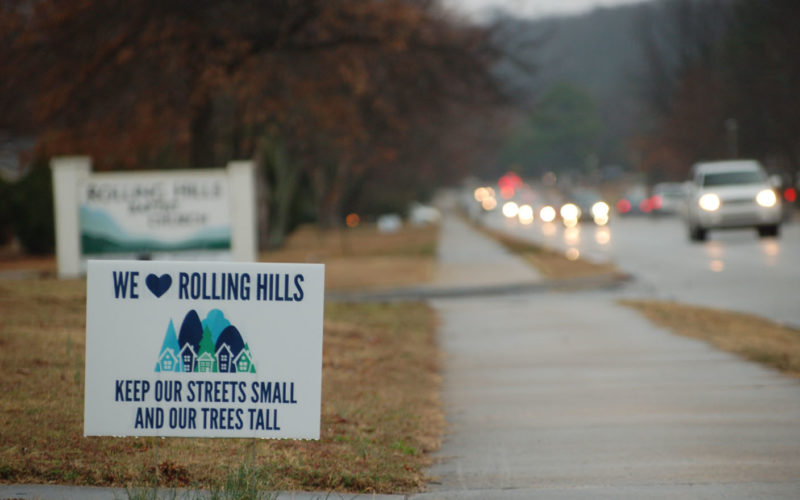A potential developer could put homes on lots half the size of those previously allowed and build around a proposed indirect connection from Rolling Hills Drive to Crossover Road under measures the Fayetteville City Council approved May 1.
The council voted 5-3 to rezone about 23 wooded acres east of Rolling Hills Drive and Old Missouri Road. The land would remain a residential zoning district. However, minimum lot size for a single-family home would be 4,000 square feet, as opposed to 8,000 square feet previously.
Also, density is higher under the new zoning, with up to 10 units per acre allowed. The former residential zoning allowed up to four units per acre.
In a separate vote, the council unanimously supported downgrading Rolling Hills’ classification on the overall street plan from an arterial to a collector street. Arterial streets are thoroughfares that connect one part of a town to another, possibly with four lanes of traffic. The new collector street classification will keep Rolling Hills as a two-lane road.
That same vote also changed slightly a previously established proposed connection on the city’s overall street plan. The new line on the map shows Rolling Hills extending east from the dead-end intersection with Old Missouri Road over to Oak Bailey Drive. Drivers seeking to get onto Crossover Road could do so via Old Wire Road. A previous connection on the map, which has been part of the city’s street plan for two decades, made the route a straight shot from Rolling Hills to Crossover Road.
A neighborhood-led campaign opposing the rezoning and the street connection emerged around the end of last year. The Planning Commission first took up the rezoning in January, with the street classification in March.
Neighbors donned T-shirts and placed signs in their yards saying, “Keep our streets small and our trees tall.” Hundreds of emails and letters were written to City Hall. People packed a Town Hall in February at Rolling Hills Baptist Church. A sizable portion of that crowd attended subsequent public meetings on the subject.
Nicole Claesen, a leader of the effort, said May 1 she and other members of the community have established Friends of Fayetteville Forests to get an outdoor classroom established in the wooded area. Several who have spoken have expressed concerns over potential flooding and harm to wildlife and ecology as a result of possible development at the site.
Council Members Justin Tennant and Sarah Bunch, both of Ward 3, voted against the rezoning, as did Mark Kinion. Mayor Lioneld Jordan said he would have voted against it because of environmental reasons.
Council members who supported the rezoning said the new district will serve as one step above the previous residential zoning as far as intensity. Kyle Smith read minutes from a 1978 city meeting when the Huntingdon subdivision first was being developed in which residents then stressed similar concerns.
Residents who spoke May 1 supported downgrading Rolling Hills but wanted the connection removed from the street plan altogether.
The connection will serve as a way to guide development, City Planner Andrew Garner said. No money or resources would be dedicated to it, but its potential construction could help east-west connectivity in the city, he said.
Tennant said he had faith in the city staff, which recommended the plan.
“Plans do change and they should change,” Tennant said. “But you should have one.”
__
Other items
Fayetteville’s City Council met May 1 and approved:
• Rezoning about 56 acres owned by Jim and Judith Hazen at Rupple and Mount Comfort Roads, which would open the mostly agricultural area to development.
• Rezoning about 7 acres at 4550 N. Crossover Road to allow development of Keypoint Church.
• An ordinance allowing alcohol sales at bars starting at 7 a.m. Monday through Saturday.
Source: Staff Report






